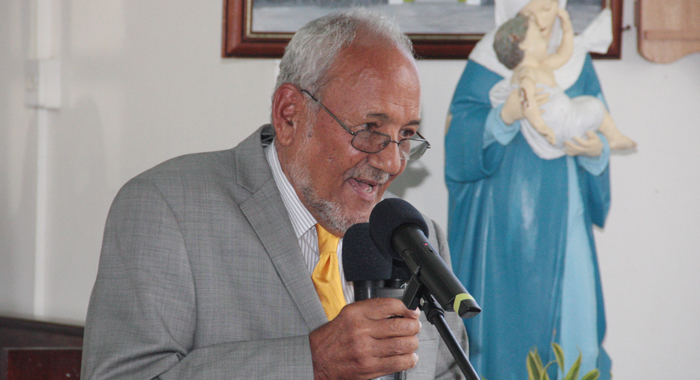The government is considering its options regarding the Commission of Inquiry into the Ottley Hall Marina Project in light of the Privy Council ruling last month that ordered that the sole commissioner take no further part in the inquiry.
The London-based tribunal, which is this country’s highest court, ruled that the Interim Report on the Ottley Hall Marina Project by the commissioner, retired High Court judge Ephraim Georges, “contains far too many firm statements of the misbehaviour of the appellant”.
The appellant, former prime minister Sir James Mitchell, whose New Democratic Party administration constructed the marina, had accused Georges of apparent bias, a submission that the privy council upheld.
Related: Former PM Sir James wins at Privy Council
Prime Minister Ralph Gonsalves, whose Unity Labour Party administration set up the inquiry, has acknowledged that the ruling may signal the end of the inquiry, but said his government will be advised by Attorney General Judith Jones-Morgan.
“The Privy Council has ruled that the past commissioner, Justice Georges, should not have anything further to do with the inquiry. Two options are opened from that standpoint to the government. Either, let the Inquiry as it stands at the moment, which the last deadline would have been December 31st, expire and not renew it, or to resume an inquiry under a different commissioner to start the process afresh,” Gonsalves, who is also Minister of Legal Affairs, told his first press conference of the year.
He, however, noted that one of the principals of the project, former chair of the then National Commercial Bank, Richard Joachim is already dead.
“Would that make any sense in the circumstances?
“And then you have the preliminary report of the judge. That preliminary report has now to be read in the context of what the Privy Council has said vis-à-vis Sir James,” Gonsalves said.

He, however, noted that the Privy Council judgment is about one issue: “The question as to whether the commissioner, in all the circumstances was tainted by a bias so that he ought no longer to sit on it for Sir James to give evidence.
“The Privy Council doesn’t say that the government must stop the inquiry you know. That’s not before the Privy Council. And the Privy Council doesn’t say you shouldn’t have another commissioner who asks Sir James to come and give evidence in relation to the Ottley Hall matter. What they have spoken about, not as far as the government is concerned, [but] as far as the judge is concerned, he showed bias,” Gonsalves said.
He pointed out that the inquiry has collected “a body of evidence” that has been collated and that there is a report.
“So that body of evidence, that report, plus the judgement of the Privy Council can all be studied by the Honourable Attorney General to see whether or not she would advise transmission of all of those in an administrative sense to the Director of Public Prosecution and let him look at it.
“The question as to whether the government is going to restart an inquiry, I have outlined for you some of the challenges there, including in the case of Mr. Joachim, who was the chairman of the bank at the time; Mr. Joachim is now of blessed memory.
“He had given evidence to a judge before and the judge had commented on that evidence. So that’s where we are,” Gonsalves told reporters.
“In going forward, I think that what has to happen, the Attorney General has to look at all the matter which has been collated, which is there for collation. There was a lawyer attached to it. He can help her in getting all of these things in one document.
“This is now an administrative process. It’s not a commission process any longer and to be sent to the appropriate judicial authorities.
“If, for instance, upon studying the matter that there is a sufficiency of suggestive evidence against Dr. Rolla, for instance, that’s for those authorities, that’s not for the government.
“The government was concerned about, as I said, getting the truth, and have that help us to see that we don’t make some of these mistakes again, and secondly, very importantly to facilitate us in negotiating the debt relief. And we successfully negotiated the debt relief by 2007.
“And the process involving Sir James and the judge was a lengthy one. It went to the Privy Council, came back to the local court and went back again.
“And I always want to make this point. Look at the title of this case. It’s Sir James against Justice Gorges, the commissioner of the inquiry,” Gonsalves said.
Background

The Ottley Hall development project began in the 1990s when Sir James was prime minister and minister of finance under the New Democratic Party administration.
The project was a disaster and funds ran out with the development unfinished. It was later determined that the value of the work was lower than the amount of money that the government said it had spent on the project.
The Gonsalves Unity Labour Party government, which came to office on March 28, 2001, set up a commission of inquiry in April 2003, and Governor-General Sir Frederick Ballantyne appointed Georges to lead an inquiry into the failure of the project.
Clause 13 of the terms of reference required Georges to immediately report anything that may show a criminal act, a bribe or fraudulent behaviour.
Georges produced an interim report pursuant to clause 13. The report included a number of adverse findings about Sir James.
Sir James was granted leave for judicial review in relation to the statements made in the report.
The judge held that a fair-minded observer would not conclude from the contents of the report that there was a real possibility of bias and the application was dismissed.
The Court of Appeal dismissed Sir James’ appeal and held that the test was whether Georges had closed his mind and demonstrated irreversible prejudgment and prejudice.
Sir James then appealed to the Privy Council.







Whatever happened over the near bankrupting of the NBC bank and its ensuing sale is a much more provable matter than Ottley Hall boat yard.
The persons who headed the organisations that borrowed all that money from the bank should be locked up.
Locking up the borrowers is not an easy proposition. Can any wrongdoing on the part of the borrowers be proved? If I go to a bank and ask for a loan of $5 million and the bank approves the loan, am I to be blamed? Banks have officers whose duty it is to look at my collateral, to assess the risk of lending to me and approve or disapprove the loan as necessary.
HOWEVER, if the problem is that those loans officials were subject to pressures from beyond the walls of the bank then you’ve got to prove that. My policy, throughout my working life when asked to do something about which I was doubtful, was to request, “Please put that in writing”. It’s called “Cover your a**”, and is a well known policy for all persons in tricky bureaucratic positions.
The difficulty with proving wrong-doing is that in SVG we have far too many people of the kind I knew in Guyana who, when the “Kabaka”, a.k.a. Linden Forbes Sampson Burnham, said “JUMP”, responded “How high, Boss?” rather than giving their considered opinion that jumping in some circumstances was liable to lead to broken bones, if not death. But how do you prove your case, in the absence of any documentation, when such a lack of “testicularity” occurs? And just look at the state in which that such inability to stand up to external pressure has left Guyana’s institutions today.